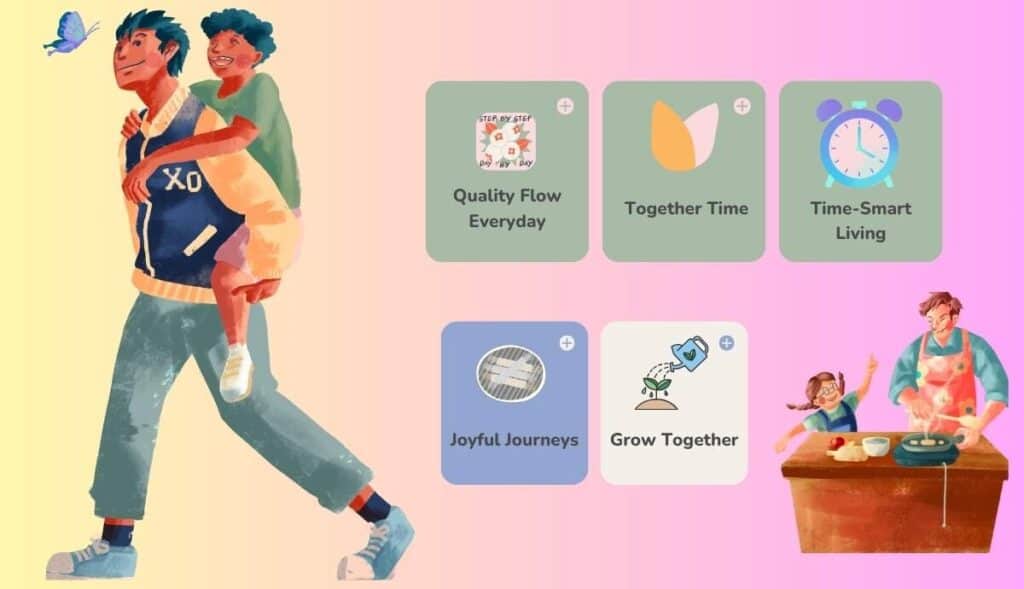In today’s fast-paced world, balancing work, family and personal life can feel like an uphill battle. Many parents worry that their demanding schedules might prevent them from building strong family bonds and meaningful relationships with their kids. And it’s true; being constantly busy does make it harder to connect. However, building a strong parent-child relationship isn’t just about spending hours together; it’s about making the moments you do have truly count. Strengthening family bonds is essential for a happy home.
Remember, building stronger relationships with your kids starts with simple moments. Take the time to engage in conversations, ask about their day, and genuinely listen. Finding opportunities to connect can greatly enhance the experience of building stronger relationships with your kids.
In this guide, you’ll find simple strategies, time-smart activities, and mindful shifts you can make right now—even with your packed schedule.
As we explore different techniques, keep in mind that building stronger relationships with your kids requires consistency and effort, but the rewards are immeasurable.
By implementing these tips, you will be on your way to building stronger relationships with your kids, ensuring a lasting connection.

Why Building Stronger Relationships Matters
Ultimately, by focusing on building stronger relationships with your kids, you’ll foster an environment that encourages open communication and emotional security.
Kids don’t need perfect parents. They need present ones.
A strong parent-child bond boosts emotional security, reduces behavioral issues, and nurtures confidence. For busy families, this connection becomes even more crucial. When life is chaotic, that bond becomes your safe harbor.
Every little effort counts when it comes to building stronger relationships with your kids, turning mundane moments into cherished memories.
Make the Most of Everyday Moments
We often wait for “quality time,” but real connection happens in everyday routines.
Turn Routine into Connection
- Grocery shopping? Let them help plan meals.
- Bedtime? Create a five-minute check-in ritual: “What made you smile today?”
- School drop-offs? Use those 10 minutes to play a question game.
Browse more on the topics: 5-Minute Fixes: Quick Solutions for Common Family Frustrations
Schedule “Unbusy” Time
Yes, block it out like a meeting. Even 20 minutes a week of undivided attention matters. No phones. No multitasking.
Scheduling time for activities specifically aimed at building stronger relationships with your kids can greatly enhance family bonding.
Implementing small rituals will greatly aid in building stronger relationships with your kids and create lasting family traditions.
Try These Micro-Connection Ideas
- Family walks
- Drawing or coloring together
- Reading aloud—even to older kids
- Laughing over silly YouTube videos (kid-approved!)
Build Family Rituals (They Don’t Have to Be Fancy)
Consistency builds trust. Create small traditions like:
- Taco Tuesdays
- Saturday pillow fights
- Friday dance-offs in the living room
🔗 Internal link: Family Date Night: Fun Activities Everyone Will Love
Use Tech—But Make It Work for You
Technology isn’t the enemy. When used intentionally, it can strengthen bonds.
Smart Use of Apps
- Use photo-sharing apps to build a digital memory wall
- Try co-op games that require teamwork
- Set timers for screen-free breaks together
🔗 Internal link: Tech-Savvy Families: Apps That Help You Save Hours Each Week
Using technology intentionally can also be a great way of building stronger relationships with your kids, making connections in a modern way.
Speak Their Love Language
Not every child feels loved the same way. Tune into how they respond to:
- Words of affirmation
- Physical touch
- Acts of service
- Gifts (even small notes count!)
- Quality time
Try the quiz here:
🔗 External link: Love Languages Quiz for Kids
Focus on Listening, Not Fixing
Your child may not want a solution—they may just want to be heard.
- Pause and give eye contact
- Nod and reflect: “That sounds really frustrating.”
- Avoid jumping to judgment or advice
Encouraging them to express themselves is fundamental to building stronger relationships with your kids, nurturing their emotional well-being.
Be Okay With Imperfect Moments
Sometimes connection is messy. That’s okay. Your effort counts more than perfection.
When You Miss the Mark
- Apologize genuinely
- Repair with a hug, laugh, or small act
- Try again tomorrow
Make Time for One-on-One Moments
Even in large families, individual attention matters. A walk with just one child. A bedtime story just for them.
Recommended link: Quality Time for Couples: How to Stay Connected on a Busy Schedule
Taking time to reflect as a family will aid in building stronger relationships with your kids, allowing everyone to feel heard and valued.
Reflect as a Family
Use Sunday evenings to reflect and reset:
- What went well this week?
- What did we learn?
- What should we try next week?
Create a family journal or whiteboard for shared wins.
How to Stay Connected During Tough Phases
Each time you validate their feelings, you contribute to building stronger relationships with your kids, strengthening the bond even further.
Every family goes through stressful periods—be it a new job, relocation, financial stress, or health concerns. These phases can strain even the strongest bonds.
But they can also become powerful opportunities for emotional connection.
- Be open about feelings without burdening children with adult worries
- Maintain small rituals like bedtime hugs or weekend pancakes
- Let your kids know that your love and presence are steady, even when life isn’t
Supporting Your Child Emotionally
Children of all ages crave emotional support, even if they don’t always express it clearly.
- Name their emotions: “It sounds like you’re feeling left out.”
- Validate: “That must have been really hard for you.”
- Empower: “What do you think could help you feel better?”
This approach strengthens your bond and builds emotional intelligence.
Quick Connection Ideas by Age
Here are age-specific bonding activities that fit even the tightest schedules:
Toddlers (1-3):
- Peek-a-boo games
- Shared storytime
- Sensory play (e.g., water, sand)
Preschoolers (4-6):
- Drawing together
- Silly songs and dances
- Simple baking sessions
School-age (7-12):
- Board games
- Bike rides
- Shared journaling or gratitude lists
Teens (13+):
In conclusion, continuously striving for building stronger relationships with your kids will significantly enhance your family dynamics.
- Coffee or smoothie runs
- Watching shows together
- Open-ended conversations while driving
What Working Parents Can Do Differently
If both parents are working full-time, bonding doesn’t have to suffer. It just needs to be intentional.
- Set a recurring 10-minute “connection slot” daily
- Use voice notes or surprise texts during work breaks
- Make the most of weekends—even if it’s just morning breakfast together
The goal isn’t to do more—it’s to be fully present in whatever time you already have.
Simple Conversation Starters
Want to spark deeper conversations without feeling awkward? Try these:
- “What was the funniest thing that happened today?”
- “If you could be an animal, what would you be and why?”
- “What’s something you wish grown-ups understood about kids?”
These questions build trust, spark laughter, and open up important insights.
The Role of Play in Connection
Play isn’t just for little kids. It’s a universal language that helps children express themselves.
- Let them lead the play—this gives them a sense of control
- Join in without correcting or directing
- Be silly. Laugh together. Connection lives in joy
A Final Thought
“Children spell love… T-I-M-E.” – Dr. A. Witham
FAQs: Building Stronger Relationships with Your Kids
Q1: What’s the most effective way to connect with my child daily?
Be present in micro-moments. A 5-minute chat without distractions goes a long way.
Q2: What if I have multiple kids and limited time?
Rotate one-on-one time weekly, and use shared rituals like dinner or storytelling.
Q3: Can screen time be bonding time?
Yes, if it’s co-viewed or co-played. Try apps and shows that spark real conversation.
Q4: I work long shifts—how do I stay emotionally connected?
Leave notes, voice messages, or draw pictures together on weekends. It adds up.
Q5: What if I didn’t grow up with strong bonds myself?
You’re already changing that story. Every positive interaction you create is growth—for both of you.
Recommended External Resources
Greater Good Science Center – UC Berkeley

For more insights on building stronger relationships with your kids, consider exploring various parenting resources available online.


